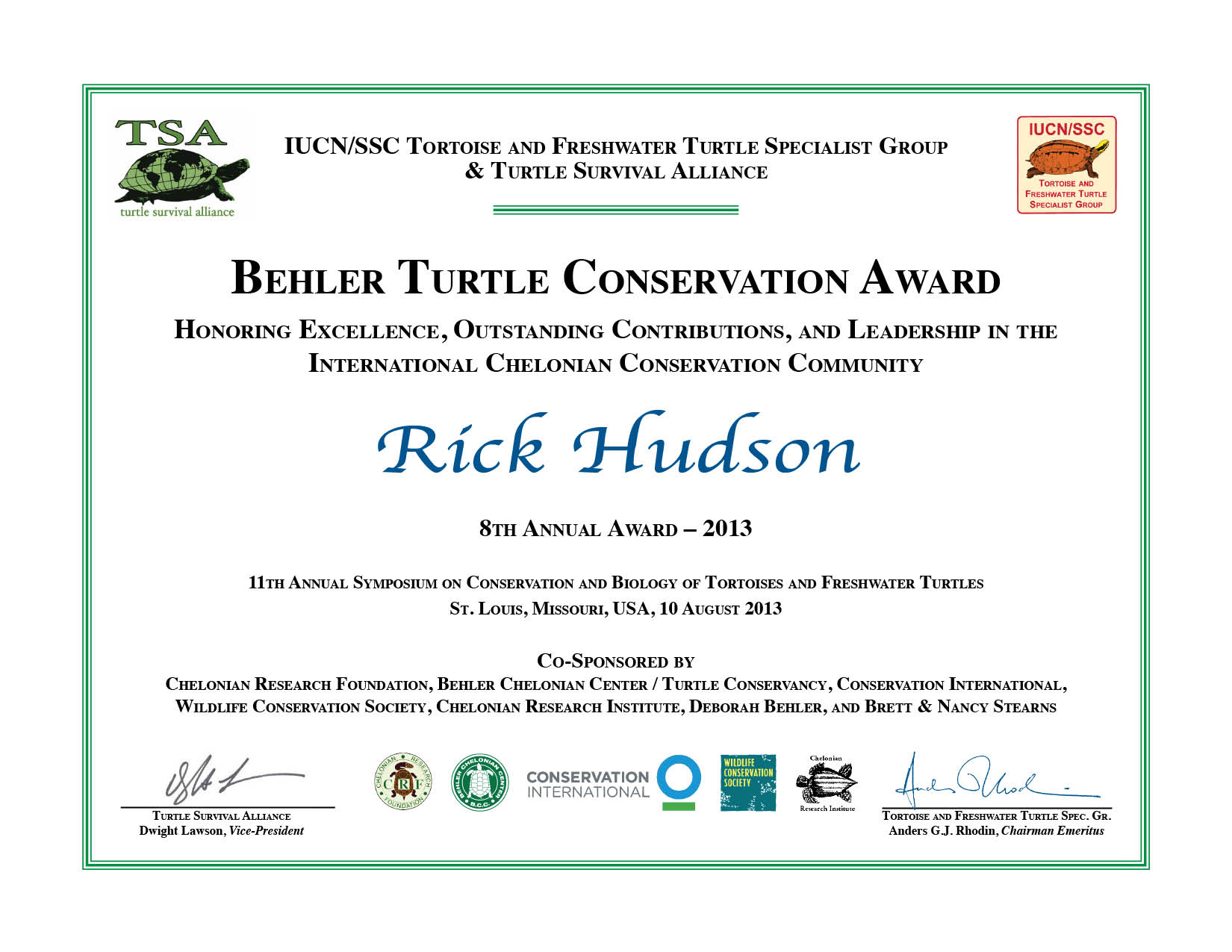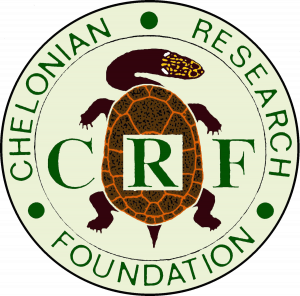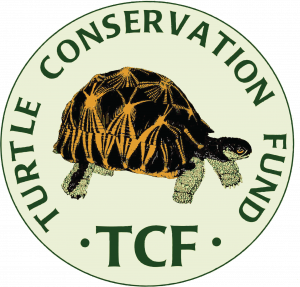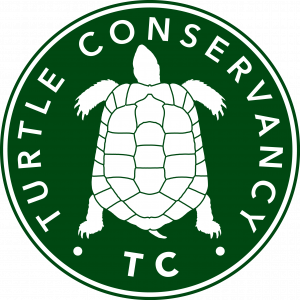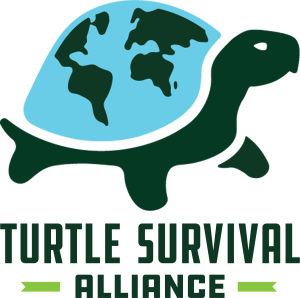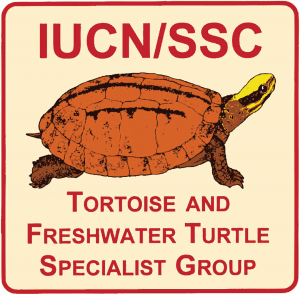Rick Hudson
Rick Hudson Receives the 8th Annual 2013 Behler Turtle Conservation Award
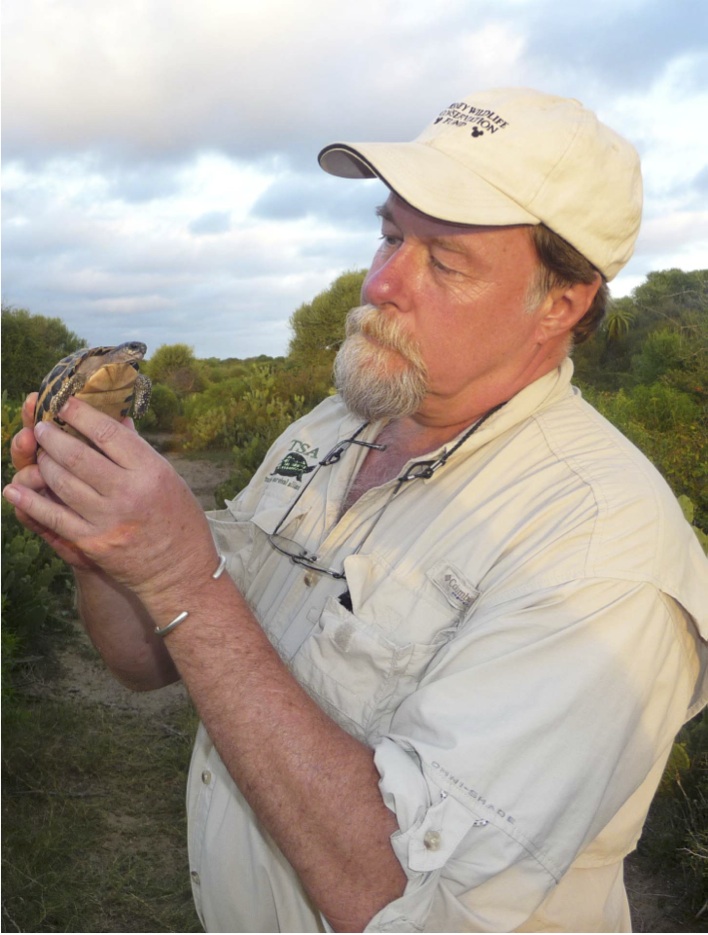
Rick Hudson
Rick Hudson Receives 8th Annual Behler Turtle Conservation Award
by John Iverson, Anders G.J. Rhodin, and Brian D. Horne
from Turtle Survival Magazine 2013:60–61.
(download pdf here)
Raised in the small, rural mountain town of Stuart, Virginia, just off the Blue Ridge Parkway, Rick Hudson, spent his formative years plying the local streams and springs for salamanders, snakes, and turtles and his Herp affliction became apparent at an early age. His fascination with all things herpetological was indulged by his parents despite the fact that his long- suffering mother had a true snake phobia. However, she gladly took him for rides following summer rains to search of box turtles, while his father was called on to build homes for his son’s growing menagerie. Rick became known locally as the “guy to call when you found a reptile” and by the age of 12 had established a backyard zoo that attracted local media attention. In 1966 the hometown newspaper ran an article that quoted Rick as saying that when he grew up he wanted to be a naturalist and work in a real zoo. Few people can say that they are doing now what they said they aspired to do as a child. Destined to be a zoo man, his earliest childhood memory was at the National Zoo at the age of four.
Herpetological opportunities were sparse in rural Virginia but that improved when Rick moved to Richmond in 1972 where he found likeminded people that enjoyed collecting and keeping herps. He earned a BS degree in Biology from the University of Richmond in 1977and began seeking employment in zoo reptile departments. With few job prospects he decided to improve his marketability by enrolling in a veterinary technology program under the direction of a former zoo veterinarian, Dr. Stuart Porter. Porter helped open the door to the zoo world for Rick that ultimately led him to his first and last job in 1980, at the Fort Worth Zoo where he has spent his entire 33-year professional career. He served as Assistant Curator in the zoo’s world-renowned Herp Department for twenty years, moving to the new Conservation and Science Department in 2000.
Prior to his involvement in the turtle world, Rick established a reputation for organizing zoo-based conservation programs, most notably through his efforts to save several highly threatened Caribbean iguana species. He organized and chaired the Lizard Advisory Group for the American Zoo Association (AZA), becoming involved in West Indian Rock Iguana (Cyclura) conservation following the rediscovery of the Jamaican Iguana. Rick organized the 1993 workshop in Kingston that laid the foundation for the recovery of the Jamaican Iguana – now regarded as one of the world’s premiere conservation success stories – a program with which he maintains close ties today.
The Kingston workshop ultimately led to the formation of the IUCN West Indian Iguana Specialist Group (now the Iguana Specialist Group) which Rick co-chaired for ten years. Today Rick remains active in iguana conservation, and is the Executive Director of the International Iguana Foundation that raises and administers funds to support research and recovery programs for critically endangered iguanas throughout the Caribbean, Central America, and Fiji.
In response to the Asian turtle crisis in the mid-1990s, Rick began taking an active role in the AZA Chelonian Advisory Group, and helped guide the restructuring of the AZA’s collection plans to make them more conservation-based. The Fort Worth Zoo’s herp collection responded as well, establishing successful breeding groups of many endangered Asian species, including Painted Terrapins, Golden Coin Box Turtles, Pan’s Box Turtles, Annam Leaf Turtles, McCord’s Snakeneck Turtles, and initiating some of the first zoo-based work with captive Impressed Tortoises.
In 2000 Rick joined Kurt Buhlamm, at the Savannah River Ecology Lab in South Carolina, with John Behler, Dwight Lawson, Dave Collins, and Whit Gibbons. Concerned with the Asian turtle crisis, they discussed how best to utilize their facilities for endangered Asian turtles. It was there that the idea was born to hold a workshop to address the Asian turtle crisis. Rick convinced the Fort Worth Zoo to host the workshop and plans got underway with a January 2001 target date. As the international invitation list began to take shape and key players were identified, word began to circulate “Why is an iguana guy holding a turtle workshop?”- a fair question given Rick’s well-known iguana background.
During this time he took comfort, and inspiration, in knowing that his long-standing colleague from the iguana world, John Iverson, was able to successfully work with both chelonians and iguanas. In fact, Rick’s first turtle-related publication was co-authored with John, a feeding note on Alligator Snapping Turtles in Herp Review.
The Fort Worth Zoo workshop was an arduous three-day affair that brought together 80 turtle experts from around the world, with representatives from all of the various sectors that had a stake in Asian turtle conservation, including groups that traditionally shared little in common and rarely communicated. As expected, the workshop, facilitated by the Captive Breeding Specialist Group and its Chair, Ulie Seal, was fraught with challenges, and it was not until the eleventh hour that a new sub-group came together, with representatives from all constituent sectors, and committed to working together to save Asia’s rapidly declining turtle fauna. Thus, the Chelonian Captive Survival Alliance was born as an IUCN Task Force, co-chaired initially by Rick Hudson and Kurt Buhlmann. The name was soon changed to the Turtle Survival Alliance (TSA) and Rick has continued to lead this organization’s development from that eclectic workshop in 2001 to a global turtle conservation enterprise with an annual budget of over a million dollars. Rick has charted an ambitious path for the TSA with active field programs in not only Asia but around the globe. He maintains direct involvement in the planning and implementation of these programs, and has a keen eye for recognizing talented and motivated people to lead them. Furthermore, Rick has been the driving force behind finding a new home for the TSA, the Turtle Survival Center, in South Carolina. This facility allows TSA to address its founding mandate of protecting species in captivity that have little success of surviving in the wild.
Rick embodies the true spirit for which this award was created: to honor leadership and excellence in the field of tortoise and freshwater turtle conservation. Rick’s recognition in the turtle conservation community is largely tied to the extraordinary success of the TSA and his leadership role in that organization’s rise to prominence. He does not have an advanced academic degree, nor has he written books or published major scientific works. However, he has led the development of an incredibly effective turtle conservation organization, and he has worked on the front lines in efforts to help prevent the extinction of several Asian turtle species. Rick’s direct and indirect contributions to global turtle conservation easily match those of the previously honored recipients, and his career path has closely followed that of the late John Behler for whom this prestigious award is named. He is emblematic of the growing corps of conservation specialists whose background has been primarily in zoo management and herpetoculture, as those disciplines become ever more important in our global struggle to help prevent turtle and tortoise extinctions in our time. His award is highly deserved and reflective of his important standing as a true and prominent leader in the global turtle conservation community.
In Rick’s own words: Being selected by my peers to receive this award is certainly the greatest accolade of my professional career and I am honored to join this select fraternity of prominent turtle biologists. Inasmuch as my success in turtle conservation is linked with that of the TSA, I feel it appropriate to mention those that have been at the core of that success: Kurt Buhlmann, Scott Davis, Brian Horne, Dwight Lawson, Heather Lowe, Lonnie McCaskill, and Andrew Walde. I also want to mention Pat Koval, Walter Sedgwick and the rest of the TSA Board of Directors: your trust in me is humbling and my commitment to you is that I will never let you down. Fort Worth Zoo Director Mike Fouraker deserves special recognition for his unwavering support of my conservation work, for sticking with me during the hard times, and for providing a home base for the TSA. I pay tribute to Ulie Seal and John Behler: both exerted major influences on my conservation ethic but moreover on how I attack problems and deal with difficult challenges. I was privileged to spend a month with John in Madagascar in 1991 on our first trip when the addiction began. It was a magical and unforgettable experience, and changed us both forever. But if there is one person that was my greatest example, it was my father, Dick Hudson, who instilled in me his work ethic. Finally if there is one compliment that I have received over the years that sticks with me, it is this gem from my colleague in Madagascar, Christina Castellano: when asked to describe Rick Hudson by someone that didn’t know me she replied, “All I can tell you is, the guy knows how to get s___ done.” If this is my epitaph, then I will consider my career a success.
